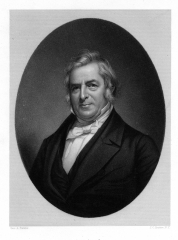William Colgate
one of the most active members of the New York City board in bringing about the union of the two institutions. A solid, substantial, kindly, and devout businessman, not unlike Jonathan Olmstead or Seneca Burchard, he was to become as influential as they in the life of the Institution. Born in England in 1783, the eldest of five sons, he had been brought to Maryland at the age of twelve when his father, Robert Colgate, was forced to flee with his family from his home, Filston Farm, near Sevenoaks, in Kent, because, according to family tradition, he had agitated for parliamentary reform.
View Filston Hall in a larger map
When William Colgate was seventeen he entered the soap and candle business in Baltimore, but later moved to New York where in 1806 he opened his own shop in Dutch Street. As a result of his almost undisputed control of the soap and candle market during the War of 1812 he accumulated a large fortune. Soon after establishing his business he joined the First Baptist Church, a step which launched his long career as an active and outstanding churchman. He was deeply interested in Baptist foreign missions, Sunday schools, and ministerial education. Unlike many other wealthy philanthropists of the period, Deacon Colgate limited himself

